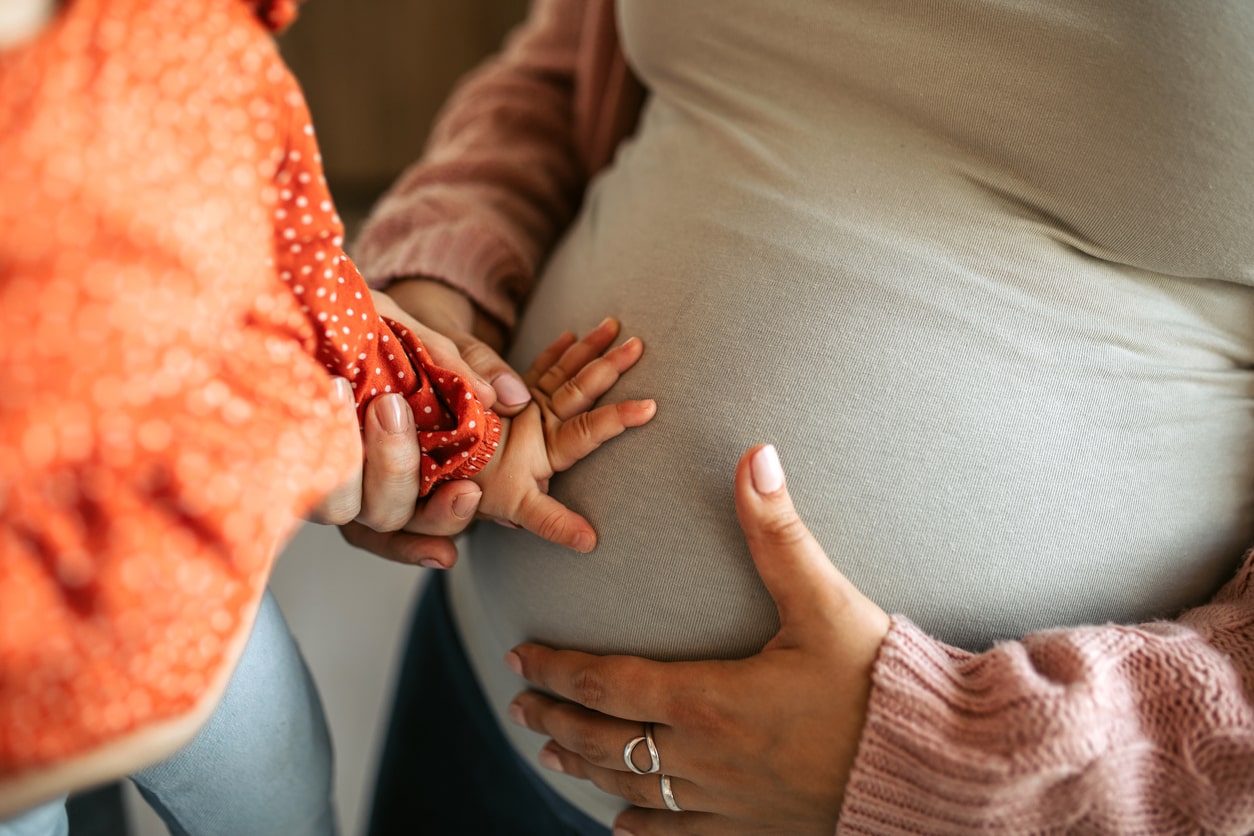6 Months Pregnant: Body Changes, Symptoms & an Essential Checklist

At six months pregnant, you are two-thirds of the way through your pregnancy and getting closer to meeting your baby every day!
As the third-trimester approaches, we consider a timely checklist, your baby’s development, changes to your body, and what to expect at your upcoming prenatal visits.
6 Months Pregnant Checklist
Here are some things you may want to do during the sixth month of your pregnancy:
- Look into childcare options if you will be returning to work after you have your baby.
- Think about who you want in the delivery room to support you.
- Consider hiring a doula.
- Develop a birth plan.
- Sign up for a childbirth education class.
- Figure out two routes to the hospital or birthing center.
- Begin making a list of baby names.
- Plan a maternity photoshoot for the third trimester.
- Plan your baby shower and create a registry.
- Start looking for a pediatrician (Tip: If you have friends that have young children ask them for a recommendation!).
- Take a day off and pamper yourself.
Your Baby at 6 Months
The sixth month of pregnancy is weeks 21 to 24. You will be feeling baby kicks and movements, which are likely getting stronger, and your partner may be able to feel them too. If you feel a rhythmic twitching in your abdomen, your little one probably has hiccups, which sometimes happen as the lungs mature.
Your baby’s development is not changing as rapidly as it did in the early weeks of pregnancy, but there is still a lot of crucial growth that needs to occur before they are ready to meet you. Your baby is almost a foot long, and they weigh about 1-1.5 pounds.
During the sixth month of pregnancy, your baby can suck their thumb, fingerprints are starting to form, and their hair is developing. Your baby is getting larger, fat is forming under their skin, their lungs are continuing to develop in preparation for breathing, and most of their time is spent sleeping.
Your Body at 6 Months Pregnant

From months six to seven, your second trimester is coming to an end. You will have a growing baby bump and be able to feel your baby’s movements becoming stronger and more noticeable. Your uterus is expanding to fit your growing baby, and you may notice a few stretch marks or varicose veins. You will see weight gain, most of which can be attributed to the growth of your baby, the placenta, amniotic fluid, and an increase in the amount of blood in your body.
Your feet may have begun to swell due to the increase in blood volume, resulting in edema (or water retention). The weight of your uterus causes the veins in your legs to work double-time as they pump extra blood throughout your body, which can cause fluid to settle in your lower legs, resulting in edema.
Putting your feet up when you can, wearing comfortable flat shoes, drinking enough water, and soaking your feet in warm water with Epsom salt are all excellent ways to ease the discomfort. Compression stockings, available at most pharmacies, may also be helpful.
In most cases, edema by itself is nothing to be concerned with. However, call your healthcare provider immediately if you experience sudden and severe swelling of the face and hands, along with a severe headache and/or vision changes, as these could be signs of preeclampsia and would require medical evaluation.
Common Discomforts of the Second Trimester
These symptoms are common and are most often normal, but it’s always a good idea to discuss any symptoms you may be having with your healthcare provider at your next prenatal visit:
- Nausea, food cravings, or food aversions
- Gas, constipation, hemorrhoids, heartburn
- Frequent urination
- Increase or change in vaginal discharge
- Fatigue, insomnia, forgetfulness
- Tender or swollen breasts
- Bleeding gums, especially when you floss
- Skin and hair changes
- Excess mucus and saliva
- Mild shortness of breath
- Headaches, lightheadedness, dizziness
- Round ligament pain, lower back pain, leg cramps
- Mild swelling of legs, feet, and hands
- And your belly button may pop to an outie!
Use this list as a checklist to discuss any symptoms you may be having with your healthcare provider at your next prenatal visit.
Thoughts and Concerns at 6 Months Pregnant
As your sixth month arrives, the reality of becoming a parent for the first time, or adding to your family, may be becoming very real. You might be wondering, “What will my baby look like?” and “Am I going to be a good parent?” The unknown can sometimes bring out stressful and anxious thoughts.
As your due date approaches, your pregnancy hormones may make your mood fluctuate, but most likely not as much as your first trimester. Most people feel calmer and at ease during the second trimester because of an increase in serotonin. However, those that already suffer from depression or other mental health conditions may notice a worsening in their condition. Always speak with your healthcare provider if you are experiencing an increase in stress, feeling anxious, or having depressive thoughts.
As you approach the third trimester, try to take advantage of these final days of relative comfort and sit back and savor your pregnancy. Find ways to pamper and treat yourself and to relieve any stress that you may be experiencing.
This is a great time to start thinking about who will be present with you during your birth as a support person, research hiring a doula, ask friends with kids for recommendations for a pediatrician, and make a list of support people you can call on during the postpartum period. You should also be signing up for a childbirth education class and thinking about methods for coping during labor (Have you heard of Hypnobirthing?) as you make your birth plan.
What to Expect at Your Prenatal Visits

There will be more of the same this month as your provider checks your weight, vital signs, fundal height, and continues to track fetal wellbeing by listening to your baby's heartbeat. Your healthcare provider will likely recommend testing for gestational diabetes around 28 weeks, so expect a conversation about this test during the sixth month of pregnancy.
In most cases, if you are experiencing a healthy pregnancy, you will not have another ultrasound after your 20-week scan unless you request one, or a new health condition presents.
Your healthcare provider will discuss your risk factors for any complications and review signs of preterm labor, preeclampsia, and other symptoms to watch out for.
To learn about what milestones and pregnancy symptoms to expect next, check out Month Seven of Your Pregnancy.

